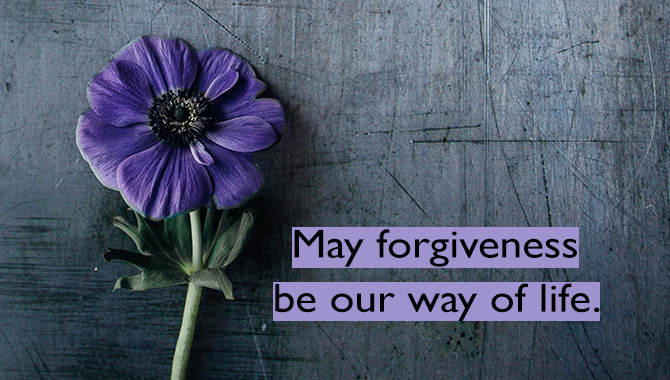June 20, 2021
Forgive each other; just as the Lord has forgiven us, so we must also forgive. ~ Colossians 3:13
A few weeks ago, Jennifer and I along with Ro were home together. It was a mild day, and we did not have a lot on our plates. Around mid-afternoon Ro looked at me and Jennifer and said, “You all have been on each other all day. Would you stop?” He got up from his chair and left the room.
We yelled after him, “We haven’t been picking on each other. We’ve been getting along fine.” But we knew deep down that there was an undercurrent of irritation or frustration with each other. I thought, “There is nothing specific that I’m upset about. I’m just in a bad mood.” What was going on?
Father Ron Rolheiser says, “As we age, we can trim down our spiritual vocabulary to three words: Forgive, Forgive, Forgive!” Or, as Jesus told Peter and us, “Forgive seven times seventy times.” We just keep on forgiving one another.
Sometimes, we get piqued with someone and we do not know why. Do we need to forgive them or ourselves? Are we aware of our need to receive forgiveness and extend forgiveness daily? Or, do we say, “We’re just fine.” Is the practice of forgiveness a way of life for us?
“The ongoing experience of being forgiven (even when we don’t think we need it) is necessary to renew our flogging spirit and keep us in the infinite ocean of grace,” writes Richard Rohr. Forgiveness means literally to release, to hurl away, to free ourselves. It is the process of letting go of our resentment, bitterness, and pain. Philip Yancey says the opposite of forgiveness is resentment which literally means “to feel again.” Resentment clings to the past, relives it over and over, and picks each fresh scab so that the wound never heals writes Yancey.
Resentment hardens our hearts and wreaks havoc in our lives. It makes us suspicious, cynical, and depressed. It takes away our inner freedom and joy says Nouwen. We know this but it is still never easy to forgive.
We can see the effects of bitterness in the “sad” life of the older son of the prodigal son. He argues with his father. “I have never wandered, never been unfaithful. I’ve stayed home and taken care of the family farm.” But, as Rolheiser points out, the real issue is the older son is “standing outside his father’s house, unable to enter into the joy, the celebration, the banquet, and the dance.”
How often does our irritation or resentment prevent us from living and enjoying life? “Resentment prevents us from seeking forgiveness and it robs us of our joy,” says Nouwen. Our bitterness spills over into how we treat one another. When we are curt, cynical, or sarcastic with one another, do we have an unresolved forgiveness issue? Rolheiser writes, “All of us have been wounded in ways small and traumatic and we can’t trivialize that or make light of our scars.” Yet, we can make a commitment to the “process” of forgiveness which heals at least one party and possible all the parties involved.
The Apostle Paul writes in Colossians 3:13, “Forgive each other, just as God has forgiven us, so we MUST forgive.” As Rohr says, “Nothing new happens without forgiveness. We just keep repeating the same old patterns, illusions, and have truths.” The poet Alexander Pope wrote, “To err is human; to forgive divine.” How do we let go of our irritation, frustration, and resentment and enter Christ’s kin-dom of joy and peace?
I have thought about the day that Jennifer and I were displeased with one another, short with our words, impatient with one another. (Note: I wish it were just “one” day, but it happens now and then for sure.) Why were we irritated? What was happening? Did we need to forgive each other? What exactly did we need to forgive each other for?
Something Henri Nouwen said struck me as very profound and potentially life changing. He asked, “What is forgiveness? Forgiveness is to allow the other person not to be God. Forgiveness says, ‘I know you love me, but you don’t have to love me unconditionally, because no human being can do that.’”
No human being (our spouse, partner, our children or parents, our boss or our co-workers, our best friend) can meet all our needs all the time. Only our Creator within can do that. “To forgive other people for being able to give us only a little love is a hard discipline. To keep asking others for forgiveness because we can only give a little love is a hard discipline as well,” writes Nouwen.
“Forgiveness alone can halt the cycle of blame and pain, breaking the chain of ungrace,” writes Philip Yancy. “While the younger son was still far off, his father saw him and was filled with compassion; he ran and put his arms around him and kissed him,” (see Luke 15:20). And the party, the feast, the dancing, and the celebrating began. Nouwen says, “Community and relationships form when we come together in a forgiving and undemanding way.”
May we forgive one another, especially those closest to us, for not being able to meet all our needs.
May we forgive ourselves for not being able to meet all the needs of another person.
May we start letting go and enter the dance.
May forgiveness be our way of life.
Blessings and peace,
Craig

